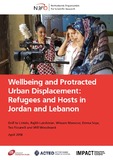| dc.contributor.author | te Lintelo, Dolf | |
| dc.contributor.author | Lakshman, Rajith | |
| dc.contributor.author | Mansour, Wissam | |
| dc.contributor.author | Soye, Emma | |
| dc.contributor.author | Ficcarelli, Teo | |
| dc.contributor.author | Woodward, Will | |
| dc.coverage.spatial | Jordan | en |
| dc.coverage.spatial | Lebanon | en |
| dc.coverage.spatial | Syria | en |
| dc.date.accessioned | 2018-05-03T09:30:29Z | |
| dc.date.available | 2018-05-03T09:30:29Z | |
| dc.date.issued | 2018-04 | |
| dc.identifier.citation | te Lintelo, D.J.H.; Lakshman, R.; Mansour, W.; Soye, E.; Ficcarelli, T. and Woodward, W. (2018) Wellbeing and Protracted Urban Displacement: Refugees and Hosts in Jordan and Lebanon, Brighton: IDS | en |
| dc.identifier.uri | https://opendocs.ids.ac.uk/opendocs/handle/20.500.12413/13709 | |
| dc.description.abstract | The war in Syria, now in its eighth year, has led to the mass exodus of the Syrian people. Lebanon and Jordan have achieved a remarkable feat by hosting millions of refugees, with many having located to urban areas, where the great majority of local populations are already situated. The war has slowed down the Lebanese and Jordanian economies. Simultaneously, the refugee influx has put tremendous pressure on urban systems providing housing and basic services (health, education, water, sanitation, electricity and waste collection) that were already strained prior to the crisis. The mass arrival has seen accelerated house rent inflation, severely diminished water supplies, daily power outages, higher unemployment rates, rising poverty, and the inability of health-care and education providers to cope with demand. Charged regional politics are severely challenging delicate societal and inter-communal harmony. There are large discrepancies in perceptions of inequality and threats between Syrian refugees and host groups. Many refugees complain about their discriminatory treatment by local business and state institutions, whereas hosts
consider Syrian refugees as disproportionately benefiting from international aid and an economic threat. This research project, conducted between April 2017 and February 2018, aimed to answer the following research questions: (1) what modalities of reception drive what kind of gendered wellbeing outcomes for refugee and host communities in cities across Jordan and Lebanon? What explains for these outcomes? (2) in what ways can policymakers, practitioners and donors support modalities of
reception that promote gender equitable, improved wellbeing outcomes for urban refugees and host communities? | en |
| dc.description.sponsorship | Netherlands Organisation for Scientific Research-Foundation for the Advancement of Tropical Research | en |
| dc.description.sponsorship | Save the Children | en |
| dc.language.iso | en | en |
| dc.publisher | IDS | en |
| dc.rights.uri | http://www.ids.ac.uk/files/dmfile/IDSOpenDocsStandardTermsOfUse.pdf | en |
| dc.subject | Migration | en |
| dc.subject | Security and Conflict | en |
| dc.title | Wellbeing and Protracted Urban Displacement: Refugees and Hosts in Jordan and Lebanon | en |
| dc.type | Other | en |
| dc.rights.holder | IDS/ACTED Lebanon/Impact Initiatives, Jordan | en |
| dc.identifier.team | Cities | en |
| rioxxterms.funder | Default funder | en |
| rioxxterms.identifier.project | Default project | en |
| rioxxterms.version | NA | en |
| rioxxterms.funder.project | 9ce4e4dc-26e9-4d78-96e9-15e4dcac0642 | en |

